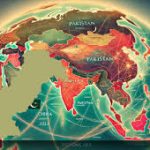Introduction
In 2025, quantum computing has moved from theoretical possibility to practical application, sparking a technological revolution that rivals the rise of the internet and artificial intelligence. With its ability to process information at speeds unimaginable to traditional computers, quantum computing is transforming industries from finance and healthcare to defense and cybersecurity. As governments and corporations race to harness its potential, quantum technology is also becoming a new frontier in global power competition. For Kuwait and the wider Middle East, the question is how to position themselves in this new technological landscape.
The Basics of Quantum Computing
Unlike classical computers that use bits (0s and 1s), quantum computers use qubits, which can exist in multiple states simultaneously thanks to quantum phenomena like superposition and entanglement. This allows quantum systems to process massive amounts of data and solve complex problems much faster than traditional computers.
In 2025, quantum machines are still not ready to replace classical computers entirely, but they are already being used in areas where traditional systems struggle, such as molecular modeling, cryptography, and optimization problems.
Global Investment and Competition
The United States, China, and the European Union are leading the charge in quantum research, each pouring billions into development. Tech giants like Google, IBM, and Microsoft are competing with startups to develop scalable, error-corrected quantum machines.
This has sparked a global tech race, with quantum computing being viewed not just as a commercial opportunity but as a matter of national security. The ability to break current encryption systems and develop unhackable communication channels gives countries with quantum supremacy a distinct geopolitical advantage.
Quantum and Cybersecurity
One of the most talked-about impacts of quantum computing is its ability to break traditional encryption. Today’s online security systems rely on mathematical problems that are nearly impossible for classical computers to solve—but quantum machines could crack them in minutes.
This raises urgent concerns for governments, banks, and corporations. In response, a new field called post-quantum cryptography has emerged, aiming to develop encryption methods resistant to quantum attacks. Nations are rushing to secure their communications, knowing that whoever achieves quantum dominance could control the digital world.
Applications in Healthcare and Science
Quantum computing is revolutionizing scientific research. In healthcare, it enables drug companies to simulate molecular interactions at an atomic level, dramatically speeding up drug discovery. This has already led to breakthroughs in treatments for diseases like Alzheimer’s and certain cancers.
In climate science, quantum computers are being used to create highly accurate models of weather patterns and climate change, giving governments better tools to prepare for natural disasters and environmental shifts.
Financial Sector Transformation
The financial world is another area where quantum computing is making an impact. Banks and investment firms use quantum algorithms to optimize trading strategies, assess risks, and detect fraud. The ability to analyze millions of variables simultaneously gives quantum systems an edge in predicting market fluctuations.
For oil-rich nations like Kuwait, quantum computing can also be applied to optimize energy production and manage complex global supply chains, aligning with broader economic diversification goals.
Middle East and Kuwait’s Role
Kuwait and its Gulf neighbors are beginning to invest in quantum research, often through partnerships with global tech firms and universities. Kuwait’s Vision 2035 strategy emphasizes technological innovation, and quantum computing is seen as a potential driver of future growth.
By funding research centers, encouraging academic collaboration, and fostering private sector innovation, Kuwait hopes to ensure it is not left behind in the global quantum race. Regional collaboration within the GCC may also help the Middle East build a stronger presence in the field.
Challenges and Limitations
Despite its promise, quantum computing in 2025 still faces significant challenges. The machines are expensive, require highly controlled environments, and are prone to errors due to quantum decoherence. Scaling quantum systems to practical, everyday use remains one of the biggest hurdles.
Additionally, the ethical and security implications of quantum power raise serious questions. How should global powers regulate such a disruptive technology? How can smaller nations protect themselves in a world where encryption can be broken?
FAQs
Q1: What makes quantum computers different from classical computers?
They use qubits instead of bits, allowing them to perform calculations in multiple states simultaneously.
Q2: Can quantum computers really break encryption?
Yes, advanced quantum computers can break traditional encryption methods, creating the need for new quantum-resistant cryptography.
Q3: What industries benefit most from quantum computing?
Healthcare, finance, logistics, climate science, and national security are among the top beneficiaries.
Q4: Is Kuwait investing in quantum technology?
Yes, Kuwait is beginning to support quantum research under Vision 2035, mainly through partnerships and academic initiatives.
Q5: What are the main challenges of quantum computing?
High costs, error correction, scalability, and ethical concerns about its misuse.
Conclusion
Quantum computing in 2025 is not just a scientific milestone; it is a force reshaping technology, security, and global power dynamics. From revolutionizing healthcare and financial markets to redefining cybersecurity, quantum machines are pushing humanity into uncharted territory.
For Kuwait and the Middle East, the challenge is to move quickly, investing in talent, research, and infrastructure to avoid being left behind. While quantum technology still faces hurdles, the nations that embrace it now will lead the global economy and security landscape of tomorrow.
The quantum revolution is here—and its impact will be felt for generations.








